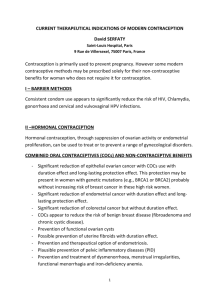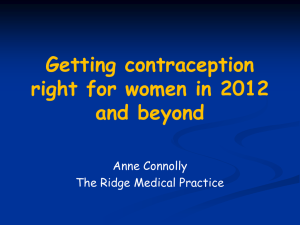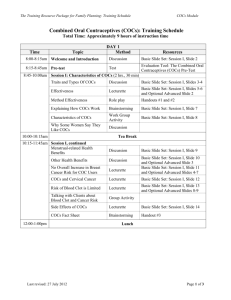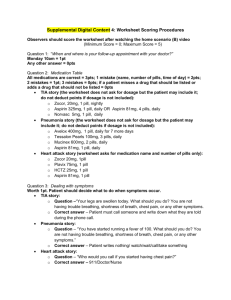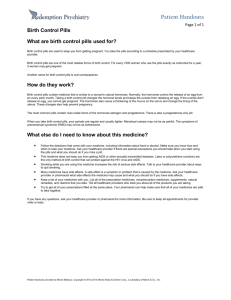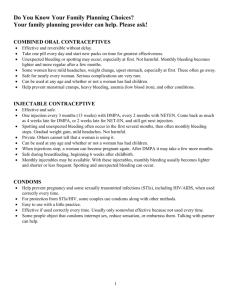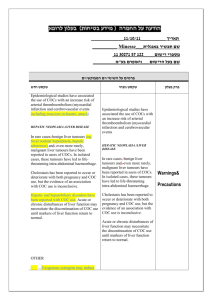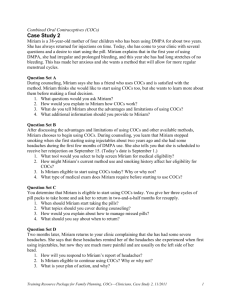Combined Oral Contraceptives (COCs)
advertisement
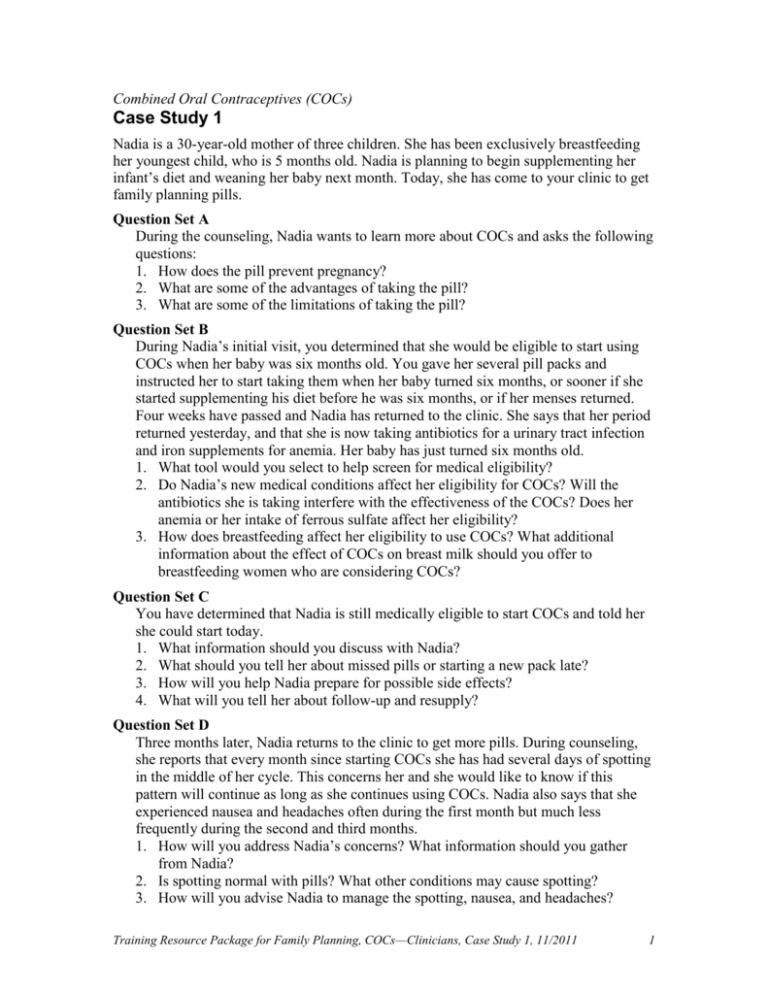
Combined Oral Contraceptives (COCs) Case Study 1 Nadia is a 30-year-old mother of three children. She has been exclusively breastfeeding her youngest child, who is 5 months old. Nadia is planning to begin supplementing her infant’s diet and weaning her baby next month. Today, she has come to your clinic to get family planning pills. Question Set A During the counseling, Nadia wants to learn more about COCs and asks the following questions: 1. How does the pill prevent pregnancy? 2. What are some of the advantages of taking the pill? 3. What are some of the limitations of taking the pill? Question Set B During Nadia’s initial visit, you determined that she would be eligible to start using COCs when her baby was six months old. You gave her several pill packs and instructed her to start taking them when her baby turned six months, or sooner if she started supplementing his diet before he was six months, or if her menses returned. Four weeks have passed and Nadia has returned to the clinic. She says that her period returned yesterday, and that she is now taking antibiotics for a urinary tract infection and iron supplements for anemia. Her baby has just turned six months old. 1. What tool would you select to help screen for medical eligibility? 2. Do Nadia’s new medical conditions affect her eligibility for COCs? Will the antibiotics she is taking interfere with the effectiveness of the COCs? Does her anemia or her intake of ferrous sulfate affect her eligibility? 3. How does breastfeeding affect her eligibility to use COCs? What additional information about the effect of COCs on breast milk should you offer to breastfeeding women who are considering COCs? Question Set C You have determined that Nadia is still medically eligible to start COCs and told her she could start today. 1. What information should you discuss with Nadia? 2. What should you tell her about missed pills or starting a new pack late? 3. How will you help Nadia prepare for possible side effects? 4. What will you tell her about follow-up and resupply? Question Set D Three months later, Nadia returns to the clinic to get more pills. During counseling, she reports that every month since starting COCs she has had several days of spotting in the middle of her cycle. This concerns her and she would like to know if this pattern will continue as long as she continues using COCs. Nadia also says that she experienced nausea and headaches often during the first month but much less frequently during the second and third months. 1. How will you address Nadia’s concerns? What information should you gather from Nadia? 2. Is spotting normal with pills? What other conditions may cause spotting? 3. How will you advise Nadia to manage the spotting, nausea, and headaches? Training Resource Package for Family Planning, COCs—Clinicians, Case Study 1, 11/2011 1 Combined Oral Contraceptives (COCs) Case Study 1—Answer Key Knowledge and Skills Objectives Addressed by COCs Case 1 1. 2. 3. 4. Describe the characteristics of COCs in a manner that clients can understand Screen clients for medical eligibility for COC use Describe when to initiate COCs Demonstrate the ability to: a. Explain to clients how to use COCs and what to do when pills are missed. b. Explain when to return to the clinic (e.g., for complications associated with blood clots). c. Address common concerns, misconceptions, and myths d. Conduct follow-up for COC clients in a way that enhances continuing safety, satisfaction, and acceptance 5. Explain how to manage side effects Answers to Question Set A 1. How does the pill prevent pregnancy? COCs work primarily by preventing the release of eggs from the ovaries. Also, COCs make the cervical mucus thick, which prevents sperm from entering the uterus and fertilizing an egg. 2. What are some of the advantages of taking the pill? They are very effective contraception. Fertility returns quickly after stopping use of the pills. They can be stopped at any time without a provider’s help. They do not interfere with sex. Monthly periods are regular and cramping is reduced. They have some additional health benefits aside from preventing pregnancy, such as reducing symptoms of endometriosis, reducing menstrual bleeding problems and cramps, and providing protection from symptomatic PID, anemia, and ovarian and endometrial cancers. 3. What are some of the limitations of taking the pill? Some users experience side effects. The pills must be taken correctly and consistently; otherwise they are not as effective. They provide no STI/HIV protection. On very rare occasions, complications may occur. Answers to Question Set B 1. What tool would you select to help screen for medical eligibility? The Checklist for Screening Clients Who Want to Initiate Combined Oral Contraceptives (COCs) identifies clients who have conditions or characteristics that prevent the safe use of COCs. Training Resource Package for Family Planning, COCs—Clinicians, Case Study 1, 11/2011 2 2. Do her current medical conditions affect her eligibility for COCs? No, her current health conditions have no effect on her eligibility for COCs. Antibiotic treatment: Antibiotics taken for a urinary tract infection would not have any effect on COC effectiveness. The only two antibiotics which may diminish the effectiveness of COCs are rifampicin and rifabutin, which are used for tuberculosis treatment. Anemia: Presence of anemia is classified by WHO medical eligibility criteria as Category 1 for COCs (use without any restrictions). In fact, COC use may help the client conserve her iron stores because the monthly bleeding will be less. This is one of the non-contraceptive health benefits of COCs. 3. How does breastfeeding affect her eligibility to use COCs? What additional information about the effect of COCs on breastmilk should you offer to breastfeeding women who are considering COCs? Use of COCs during breastfeeding may diminish the quantity of breastmilk and decrease the duration of lactation, which may have implications for the health of the baby. As a result, the WHO medical eligibility categories regarding COCs for breastfeeding women are as follows: Condition: Breastfeeding WHO Category Explanation Category < 6 weeks postpartum 4 Do not use the method > 6 weeks to < 6 months postpartum 3 Do not use the method unless no other method is available ≥ 6 months postpartum 2 Generally, use the method Because Nadia’s baby is now six months old, she is eligible to start COCs, especially because she is beginning supplementation and weaning. At this point, reduction in the quantity of breastmilk should not pose a problem. Answers to Question Set C 1. What information should you discuss with Nadia? Make sure she understands how to take the pills and the importance of taking a pill every day—it is necessary for the pill to be effective and it will reduce the likelihood of spotting. Link pill-taking to daily activities to improve compliance (e.g., take the pill every evening just after dinner or before going to bed). Discuss what to do if she misses pills, possible side effects, and warning signs of rare complications of COCs. 2. What should you tell her about missing her pills or starting a new pack late? Carefully review these instructions with Nadia and provide her with a client brochure, if available, that explains how to use pills. Training Resource Package for Family Planning, COCs—Clinicians, Case Study 1, 11/2011 3 Take one pill each day. Taking a pill at the same time each day may make it easier to remember. You can reduce nausea by taking a pill with food or right before going to bed. If you miss active pills one or two days in a row or start a pack one or two days late: - Always take a pill as soon as you remember and continue taking one pill each day. Depending on when you remember that you missed a pill(s), you may take two pills on the same day—one at the moment you remember and the other at the regular time—or even at the same time. - There is no need for additional contraceptive protection. If you miss three or more active pills in a row or start a pack three or more days late: - Take a pill as soon as possible, continue taking one pill each day, and use condoms or avoid sex for the next seven days. - In addition, if you missed these pills in week three, finish the active pills in the pack and start a new pack. Throw away the inactive pills. - Also if you had unprotected sex within the last 5 days, consider using emergency contraception. If you miss any inactive (nonhormonal) pills, throw away the missed pills and continue taking pills, one each day. 3. How will you help Nadia prepare for possible side effects? Review the possible side effects with her. Remind her that side effects are not signs of illness and they usually lessen or diminish with time; that they are common but not all women have them. Tell her to return to the clinic if she has any questions or concerns about side effects. 4. What will you tell her about follow-up and resupply? Instruct Nadia to return anytime she has questions or concerns or if she experiences any warning signs of complications. If she experiences any of these symptoms, she should stop taking the pills, use a backup method, and return to the clinic immediately. Tell her it is important to return for resupply before she runs out of pills. Answers to Question Set D 1. How will you address Nadia’s concerns? What information should you gather from Nadia? First, reassure Nadia that mild headaches, nausea, and spotting are normal side effects of COCs, are not harmful or signs of illness and usually diminish over time. Ask probing questions and make detailed notes about the side effects that Nadia is experiencing to determine the severity of the bleeding irregularities, headaches and nausea to ensure that these are not caused by underlying problems or that she has developed migraines. Check if she is taking pills consistently and correctly and ask about the time of intake. Training Resource Package for Family Planning, COCs—Clinicians, Case Study 1, 11/2011 4 2. Is spotting normal with pills? What other conditions will cause spotting? Spotting is a normal side effect of COCs. Other causes of spotting include missed pills, taking pills at a different time each day, vomiting or diarrhea, or taking anticonvulsants or rifampicin. 3. How will you advise Nadia to manage the spotting, nausea, and headaches? To reduce spotting, advise Nadia to take pills at the same time each day, perhaps with the evening meal or at bedtime, which will also reduce nausea. Inform her that taking pills in the morning or on an empty stomach may increase nausea. If the headaches bother her, she may use aspirin, ibuprofen, paracetamol, or other pain relievers. If the nausea or headaches continue to persist and are bothersome, she may try using another formulation of COCs, or you could help her choose another contraceptive method. Remind her to return immediately if headaches become severe or are preceded by a bright area of lost vision in one eye (aura). █ Note: The recommendations provided in the Answer Key comply with the guidance in Family Planning: A Global Handbook for Providers (2011 update). If national guidelines are available and provide guidance on these topics, participants should follow the recommendations in the national guidelines. Training Resource Package for Family Planning, COCs—Clinicians, Case Study 1, 11/2011 5
